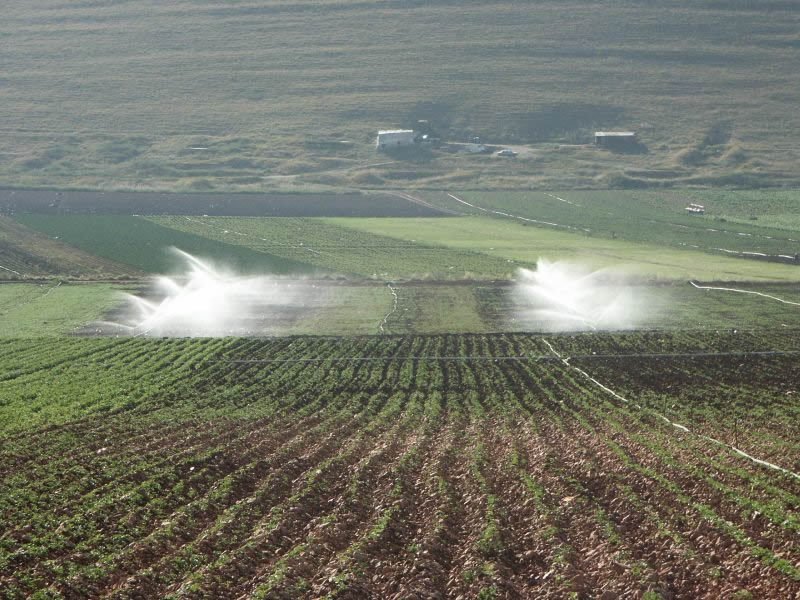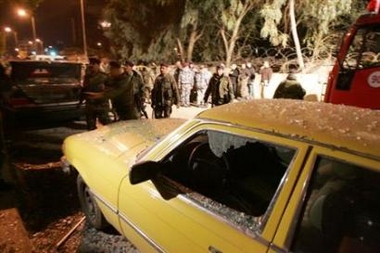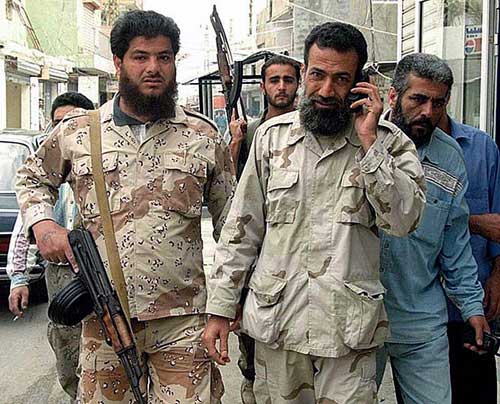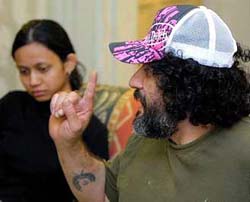 BEIRUT, Lebanon, Feb. 2 (UPI) -- Hezbollah accused Israel of killing a Lebanese shepherd in the disputed region of Shabaa Farms in south Lebanon and vowed to avenge the slaying. The 17-year-old shepherd and a hunter disappeared Wednesday afternoon in the area, a common backdrop to Hezbollah-Israeli skirmishes. The hunter returned safely, but the shepherd's body was found Thursday in the area by U.N. peacekeeping forces in south Lebanon, known as UNIFIL.
BEIRUT, Lebanon, Feb. 2 (UPI) -- Hezbollah accused Israel of killing a Lebanese shepherd in the disputed region of Shabaa Farms in south Lebanon and vowed to avenge the slaying. The 17-year-old shepherd and a hunter disappeared Wednesday afternoon in the area, a common backdrop to Hezbollah-Israeli skirmishes. The hunter returned safely, but the shepherd's body was found Thursday in the area by U.N. peacekeeping forces in south Lebanon, known as UNIFIL.
The body, riddled with bullets, was taken to a nearby hospital where the victim's family and co-villagers gathered, shouting anti-Israeli slogans to protest against Israel's frequent violations of the U.N.-drawn Blue Line along the border. Hezbollah's Secretary General Sayyed Hassan Nasrallah warned Israel Wednesday against killing the Lebanese shepherd, vowing to retaliate "without taking permission from anyone." He said Hezbollah militants will punish the killers without hesitation.
 BEIRUT (Reuters) - A bomb exploded near a Lebanese army barracks in Beirut early on Thursday, destroying a car and slightly wounding one soldier, security sources said. The sources said a local newspaper had received a telephone call from someone claiming to speak on behalf of al Qaeda and declaring that a security target would be bombed in Beirut in retaliation for the arrest last month of 13 group members.
BEIRUT (Reuters) - A bomb exploded near a Lebanese army barracks in Beirut early on Thursday, destroying a car and slightly wounding one soldier, security sources said. The sources said a local newspaper had received a telephone call from someone claiming to speak on behalf of al Qaeda and declaring that a security target would be bombed in Beirut in retaliation for the arrest last month of 13 group members.
The explosion occurred some three hours later at around 2 a.m. (7 p.m. EST) outside the Fakhreddine Barracks in Ramlet al-Baida district of the capital, shattering windows in nearby buildings.The sources earlier said the blast was caused by a car bomb but they later said it had been caused by an explosive charge near or under the car.
 By Murad Al-Shishani, After a missile attack on Israel from south Lebanon on December 27, 2005, the Organization of al-Qaeda in Iraq, or the Land of the Two Rivers, issued an audio-recording for its leader, Abu Musab al-Zarqawi, in which he claimed responsibility for the attack and said it was ordered by al-Qaeda's leader, Osama bin Laden. The attack, combined with the statement of responsibility, raised questions about al-Qaeda's presence in Lebanon. Following the attack, Lebanese authorities arrested a group of al-Qaeda members or followers of the Salafi-Jihadist movement. While the Lebanese authorities did not disclose details about the arrested suspects, the news leaks raised several questions about the presence and nature of the Salafi-Jihadist movement in Lebanon.
By Murad Al-Shishani, After a missile attack on Israel from south Lebanon on December 27, 2005, the Organization of al-Qaeda in Iraq, or the Land of the Two Rivers, issued an audio-recording for its leader, Abu Musab al-Zarqawi, in which he claimed responsibility for the attack and said it was ordered by al-Qaeda's leader, Osama bin Laden. The attack, combined with the statement of responsibility, raised questions about al-Qaeda's presence in Lebanon. Following the attack, Lebanese authorities arrested a group of al-Qaeda members or followers of the Salafi-Jihadist movement. While the Lebanese authorities did not disclose details about the arrested suspects, the news leaks raised several questions about the presence and nature of the Salafi-Jihadist movement in Lebanon.
Khazen History


Historical Feature:
Churches and Monasteries of the Khazen family

St. Anthony of Padua Church in Ballouneh
Mar Abda Church in Bakaatit Kanaan
Saint Michael Church in Bkaatouta
Saint Therese Church in Qolayaat
Saint Simeon Stylites (مار سمعان العامودي) Church In Ajaltoun
Virgin Mary Church (سيدة المعونات) in Sheilé
Assumption of Mary Church in Ballouneh
1 - The sword of the Maronite Prince
2 - LES KHAZEN CONSULS DE FRANCE
3 - LES MARONITES & LES KHAZEN
4 - LES MAAN & LES KHAZEN
5 - ORIGINE DE LA FAMILLE
Population Movements to Keserwan - The Khazens and The Maans
ما جاء عن الثورة في المقاطعة الكسروانية
ثورة أهالي كسروان على المشايخ الخوازنة وأسبابها
Origins of the "Prince of Maronite" Title
Growing diversity: the Khazin sheiks and the clergy in the first decades of the 18th century
Historical Members:
Barbar Beik El Khazen [English]
Patriach Toubia Kaiss El Khazen(Biography & Life Part1 Part2) (Arabic)
Patriach Youssef Dargham El Khazen (Cont'd)
Cheikh Bishara Jafal El Khazen
Patriarch Youssef Raji El Khazen
The Martyrs Cheikh Philippe & Cheikh Farid El Khazen
Cheikh Nawfal El Khazen (Consul De France)
Cheikh Hossun El Khazen (Consul De France)
Cheikh Abou-Nawfal El Khazen (Consul De France)
Cheikh Francis Abee Nader & his son Yousef
Cheikh Abou-Kanso El Khazen (Consul De France)
Cheikh Abou Nader El Khazen
Cheikh Chafic El Khazen
Cheikh Keserwan El Khazen
Cheikh Serhal El Khazen [English]
Cheikh Rafiq El Khazen [English]
Cheikh Hanna El Khazen
Cheikha Arzi El Khazen
Marie El Khazen
